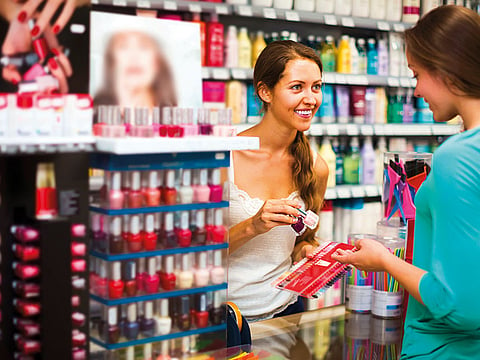The Gulf’s beauty industry seeks a new look
New brands are coming to test their chances even as digital portals create a level field

Dubai: The business of beauty doesn’t seem to care much about whether markets are headed up or down. Those nails still need a polish and the eyes need to wear a smokey look.
In meeting such constant needs of consumers, new businesses are being created, with even specialist investment firms coming calling.
“The sector was dominated by large operators of store-based retailing, which even now captures a significant share in terms of overall sales,” said Andreea Danila, Founder of Millennial Capital. “Over the past 5 years, as the retail local market became more competitive, international brands started looking for groups that can provide a holistic approach to market entry and management as opposed to securing store locations.”
Millennial Capital is bringing in a Brazilian skincare brand, O Boticário, into these markets. It is rated as one of the largest cosmetics franchises with a network of 4,070 stores, principally in Latin America.
The plan is to cover the UAE from September, using a mix of consumer-facing locations as well as through online stores. The rollout in Saudi Arabia will follow next year.
But the skincare marketplace in the UAE and Gulf is already crowded with brands and retailers. For a brand new entrant to show up will take some working on.
“The beauty and personal-care is crowded in the premium and mass category,” said Danila. “However, we have identified a significant market gap in the “masstige” category, where products are sold at an average retail price between Dh100 and Dh250. Currently, this category is non-existent in the region, with few international entrants such as Kiko Milano, Urban Decay, NARS capturing market share. O Boticário fits into the masstige category.”
Other brands are working on different retail-facing formulas. Klara Cosmetics is launching in the Gulf this month exclusively through the Landmark Group owned Lifestyle stores. More of such niche labels — owned by the founder and not part of a conglomerate — are showing up on shelves and online shopping portals in the Gulf.
According to an industry report prepared by the Chalhoub Group, the luxury retail network operator, beautycare products sold through the Gulf’s brick-and-mortar outlets were down 5 per cent in 2017. The biggest decline was on fragrances, down 10 per cent compared to 2016.
“The makeup category was also struggling, decreasing by approximately 3 per cent, while it was still slightly positive during the first-half of 2017,” the Chalhoub findings report.
“The skincare category remained stable, still facing a slight decrease compared to 2016. As a result, the overall GCC prestige beauty market was estimated at approximately $1.8 billion (Dh6.61 billion) for 2017 compared to $1.9 billion in 2016.
“Faced with this drop in sales, international brands have reduced their marketing investments in the Gulf, where price discrepancies linked to currency fluctuations are also fuelling the distrust of consumers.”
But brick-and-mortar’s waning shine is being made up elsewhere. “Initially slow to pick up, digital retail in the GCC is indeed poised to increase massively in the coming years, at an approximate rate of 31 per cent year-on-year to $24 billion by 2022,” the report adds. “New local beauty players are capturing the essence of GCC clients’ needs and are challenging traditional firms. By shaking up the industry, forcing it to think differently and be more consumer-centric, they have a major and very positive impact.
“The industry shouldn’t be afraid of them, but to the contrary, be open-minded and support them further.”
Not just beauty brands, but even a host of allied services are just a click or two away. Want to get a professional’s help on the hair and make-up ahead of that all-important meeting or romantic dinner? Then the Blowout & Go app connects you with one, pronto.
As in the retail and F&B sectors, the traditional beauty retailing is getting a digital makeover. “We generate about 10 per cent of our overall sales online as opposed to 2 per cent industry average in the GCC,” said Danila. “We forecast a similar percentage for the first two years for O Boticario.
“However, given our licensing partnerships we will utilise the online channels not only to sell online but also to allow our customers to order online and collect in-store or to select a store and get it delivered at home. We consider the online channels as fundamental towards a holistic customer experience, along with being able to capture and analyse data.”
Sign up for the Daily Briefing
Get the latest news and updates straight to your inbox



